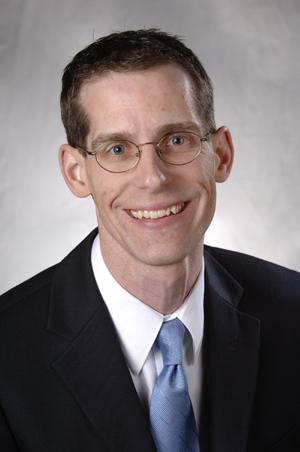
By Sister Carol Hoverman, OSF
Iowa’s four dioceses last month sponsored the Iowa Faith Formation Conference in Ames. Approximately 135 clergy and parish staff members gathered to hear Ed Hahnenberg, Ph.D., speak on “Ministry at the Margins: The Call to Serve Christ’s Mission Today.”
Hahnenberg, an associate professor of theology at Xavier University in Cincinnati, said we are living in an exciting time of significant transformation of ministry. Since the Second Vatican Council, laity is ministering in greater numbers than ever before. Each age had its challenges, he noted. In previous times, people were commanded to believe certain truths. “God or the priests or your parents told you to do something in a certain way and you’d do it,” the speaker said.
The current age is one of consumer choice, which carries over into religious experience. Many people are seeking and shopping for beliefs like commodities on a shelf. Hahnenberg cautioned that this consumer culture can fragment Christian reality and short-circuit spiritual transformation. The danger is reducing faith to being only one possibility among others. People need help to see faith as a constant. He believes we must reclaim the meaning of vocation, God’s call to each individual. The call is an invitation to a relationship, the speaker said. “It’s the response to the profound love of God’s gift.”
In the Bible this “call” usually meant a call to faith or to a special task, Hahnenberg said. In the early church, a calling involved persecution. Then, in the fourth century, the Emperor Constantine converted to Christianity and it became the state religion of the Roman Empire. It was the social norm and Christianity became less special.
Later, monasticism developed as a reaction to the “too easy Christian life,” and the monks were seen as a special class of Christians — “true models of holiness” — as they went off to the desert to pray. So there were two kinds of Christians — clergy and everybody else. In the Middle Ages, more religious orders developed.
Hahnenberg said that Martin Luther rejected these two classes of Christians, and taught that every state of life and every type of work were true vocations because it’s in daily life that people serve God and others. People didn’t have to “escape the world” and go to a monastery or convent; true holiness involved the affirmation of ordinary life. This was an innovation in the concept of “vocation.” Luther also reclaimed the idea of the priesthood of all believers, since all are baptized.
Moving on to the 20th century, Hahnenberg noted a surge in the involvement of the laity in grass roots movements under the umbrella of “Catholic action” after World War II. So it was expected that Vatican II would have something significant and positive to say about ministry of the laity. Ministry begins with our baptism into Christ as disciples.
In the Vatican II document, “Lumen Gentium,” a chapter on the universal call to holiness states that the whole church is holy, and all in the church are called to holiness. This call takes shape in various states of life — clergy, religious and laity. The distinctive vocation of laity is to “transform the secular world in the light of Christ.”
Hahnenberg said “God’s call to each person is profoundly personal and that personal vocation is the way each one lives out the universal call to holiness.”
Discerning one’s call is difficult, but “the God who made us, saves us.”
Referring to an essay by spiritual writer Thomas Merton, Hahnenberg described how each part of creation, in all its diversity, praises God by just being what it is. In like manner, God loves the wonderful diversity in each person.
“To be a saint means to be myself, my true self,” Hahnenberg said. In searching for that true self, we often confuse what “I want to be, with what God wants me to be.” In a true vocation, there is a resonance between the two.
In his final presentation, Hahnenberg referred to the 2005 U.S. bishops’ document “Co-workers in the Vineyard of the Lord.” Its primary focus is on the vocation of lay ecclesial ministry, referring to “lay persons who do ministry for a living.” This includes people who are authorized for their ministry, who work in close collaboration with the ordained and who have the requisite preparation and commitment.
“Ministry is relational, built on the Trinitarian concept of God relating to us,” Hahnenberg said. “Ministers are not primarily isolated individuals whose relationships of service are secondary.”
Although ministry involves building interpersonal relationships, it also must include building “ecclesial relationships” — structures or habits for collaboration. It is important to develop practices of consultation, ways of making decisions, writing mission statements, having shared goals, workplace policies and financial support for programs among other things.
“Ministry isn’t bringing God to people,” the theologian concluded,” We meet the God who is already there.”
(Sr. Hoverman is editor of The Witness, newspaper of the Archdiocese of Dubuque.)








